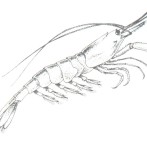
Shrimp workshop focuses on fishery reform and MPA compliance
On the 10th July 2015, Authority officers met with a range of stakeholders to consider the UK east coast brown shrimp (Crangon crangon) trawling fishery and the various challenges it faces. In addition to 26 commercial shrimp trawling fishers, representatives from Natural England, Cefas, Marine Management Organisation (MMO) and ABPMer were present to focus on a variety of issues, including Marine Protected Area (MPA) management, trawling gear innovation and levels of effort in the fishery. The report from this workshop is now available.
Given the fishery is active in several MPAs (including The Wash & North Norfolk Coast Special Area of Conservation and the Inner Dowsing, Race Bank and North Ridge Site of Community Importance) and given the Authority’s requirement to bring fishing in line with other marine industries by assessing their potential impacts on MPA features, there is a clear need to improve industry and regulator understanding of the extent, scale and environmental effects of the shrimp trawling fleet.
In addition, the industry themselves have called for fishery reform and have discussed a range of potential regulatory measures (ranging from effort reduction to a fishery closed season) with Authority officers. The industry recognises that regulatory action is likely to be required if the fishery is to successfully pursue Marine Stewardship Council (MSC) accreditation; a development that will secure long-term market viability. In order to answer both industry concerns around fishery reform and uncertainty around its effects on MPAs, the Authority convened a workshop to give all stakeholders the chance to express their views in advance of any management measures being introduced.
In fulfilling its duties to seek a co-management approach to regulating fisheries, as well as managing fishing as part of the wider marine ecosystem, Eastern IFCA encouraged workshop participants to answer three key questions in small groups:
- Where does shrimping fishing activity occur?
- Are there any practices that may threaten the fishery?
- What potential measures could have a positive effect on the fishery?
In addition, participants were asked to share their thoughts on a new draft shrimp returns form which will form the first step in improving data holdings on the fishery.
The Authority will build on the workshop by incorporating various elements of fishery solutions into an MPA shrimp fishery compliance proposal to Natural England, which will then be discussed with industry and other stakeholders at a further workshop before the end of 2015. The key outcomes of the workshop are summarised in the report.
